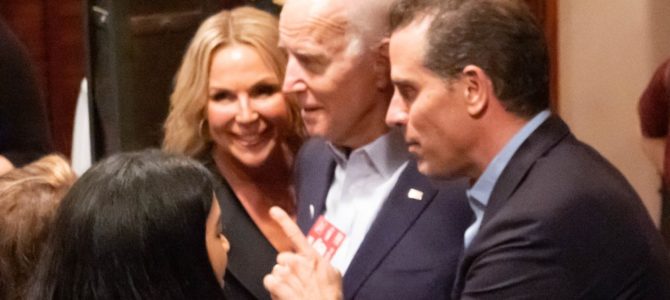
As far as The New York Times is concerned, major conflicts of interest are only a small part of a major investigation it conducted spanning three continents and involving multiple reporters. In two lengthy articles, the paper offered an in-depth look into how, while international agencies and the Biden administration are promoting electric cars, China has acquired a near-monopoly on the resources needed to build batteries for those vehicles.
The tale of how China acquired a crucial mine in the Democratic Republic of Congo from a struggling American company in 2016 is an eye-opener. So, too, is what it discovered about the massive effort the Chinese government has made through companies it finances to take over the industry and how the United States has done virtually nothing to prevent this dangerous state of affairs in the past two administrations.
But one aspect of their investigation has political implications in addition to the obvious geostrategic implications of the Chinese acquiring a stranglehold on a vital resource just at the moment the obsession with going green to halt global warming has put the government behind the production of electric cars. One of the key players in the acquisition of Tenke Fungurume, a Congolese cobalt and copper mine, from the American company Freeport-McMoRan was the Bohai Harvest RST (Shanghai) Equity Investment Fund Management Company, which is better known in the industry by its acronym BHR. BHR was founded by President Biden’s son Hunter and two other Americans in cooperation with Chinese investors.
Hunter and the other two Americans owned 30 percent of BHR and Chinese players the other 70 percent, as the Times reports. All of Chinese players, like the Bank of China, are instruments of the Communist Party government.
Hunter’s Firm Funds Buyout To Allow Deal
BHR’s role in the takeover of Tenke Fungurume from Freeport-McMoRan was to help buy out the American firm’s Canadian partner, Lundin Mining. Lundin Mining had the right of first refusal when the American company, in financial trouble due to bad investments, was forced to sell its Congolese interests — into which it had poured immense resources in developing the mine.
The U.S. involvement dated back to an effort by the Nixon administration to head off an effort by Russia to get into the good graces of then Congolese dictator Mobutu Sese Seko. The country is now run by Joseph Kabila, the son of the man who deposed Mobutu. He appears to be heavily influenced by China and is not interested in interfering with its lucrative exploitation of his country’s natural resources.
In this telling, the Chinese effort takes on the appearance of the financial equivalent of a commando raid. A company named China Molybdenum, largely owned by Beijing government surrogates, swooped in and made Freeport-McMoRan an offer it couldn’t refuse in the form of a $2.65 billion bid that was largely financed by Chinese government loans.
Lundin Mining could have stopped the deal but an investment firm registered in Shanghai bought them out, ensuring that nothing could stop China Molybdenum from acquiring what is estimated to be one of the biggest cobalt reserves in the world. The investment firm that performed that essential service was Hunter Biden’s BHR.
The Times could not find anyone who could explain how or why Biden’s BHR, of all the investment companies operating in Shanghai or anywhere else, was chosen for this task. But it did discover from public filings that none of the $1.14 billion raised to buy out Lundin came from private investors. All of it came from Chinese state-controlled entities, including, as the paper noted, bank loans guaranteed by China Molybdenum as well as cash brought to the deal through “obscure” shell companies controlled by government-owned banks.
Before the deal with Lundin was done, BHR signed an agreement allowing China Molybdenum to buy them out, and eventually it did so. By the time that happened, Hunter Biden still controlled 10 percent of BHR through a Washington-based firm called Skaneateles, LLC. A lawyer for Biden told the Times he no longer has any interest in any of these firms.
According to someone described by the paper as a “former BHR board member,” Biden and the other Americans weren’t personally involved in the cobalt sale, “the firm earned only a nominal fee from it,” and none of that money was “distributed to its owners” — although no explanation as to how so much money eluded the grasp of the firm’s main players is provided. And much like his claims about Hunter’s business dealings in Ukraine and other Chinese investments, the White House says the president knew nothing about any of it.
Failures Under Obama and Trump
This is a complicated story that raises serious questions about the failure of the U.S. government to prevent China from acquiring a stranglehold on a vital commodity. This is also a failure that continued even after President Obama left office, despite President Donald Trump’s public concerns about China’s aggressive intentions. Another sale to this same Chinese firm of an undeveloped Congolese cobalt mine still owned by Freeport-McMoRan went through with the State Department also doing nothing about it a month before Trump left office.
That Hunter Biden was playing a part in Chinese actions that directly threaten the interests of the United States is a scandal with many layers that require further unpacking. All of this is something that should have been made known to the voters before Hunter’s father was elected president of the United States.
It is no small irony that a nation like China, which flouts the concerns of the environmental lobby about carbon emissions, is getting the jump on the West on resources necessary for the abandonment of fossil fuels. But the Obama administration was either indifferent or insufficiently alarmed about the prospect of China’s plans until it was too late.
State Department Was Warned
Another interesting detail buried in the Times investigation is that among those warned by a veteran diplomat of the danger of the Chinese acquisition was Linda Thomas-Greenfield. At the time she was assistant secretary of state with responsibility for Africa.
She and members of Obama’s National Security Council now say they don’t remember the conversation. But like the rest of the Obama administration alumni who now work for Biden, she has failed upward, having been named U.S. ambassador to the United Nations.
The fact that Hunter Biden is to be found in the middle of this mess cannot be plausibly explained as a mere coincidence. Nor can we be expected to merely nod along as his father’s spokespeople continue to claim that Hunter’s business dealings were unknown to the president. We need a full accounting from both Bidens about what they knew and when they knew it about China and cobalt and why Hunter’s firm was chosen by Beijing to be a key instrument of a long-term policy objective.
Should we expect the same corporate media that told us in 2020 that evidence of Hunter’s influence-peddling with respect to his activities in Ukraine and elsewhere was “Russian disinformation,” that spiked stories on the subject and applauded as social media companies shut down discussion of the facts online, to ask the questions that need to be answered about this scandalous operation? It isn’t likely, even if the source material is an investigation by the flagship of leftist journalism.
Whether the president knew about it or fully understood the implications, Biden’s son was an instrument of Chinese policy, and voters should have known this a year ago. But however belated the revelations may be, they must be fully investigated today.









